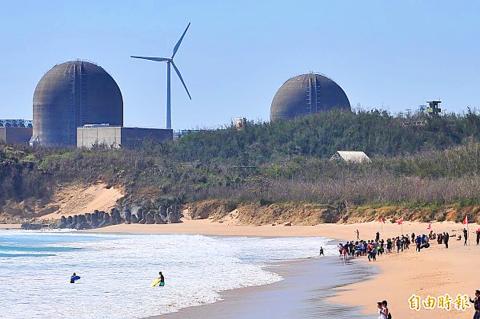Questioning Premier Lin Chuan’s (林全) pledge to meet the nation’s power demands in two years, Chinese Nationalist Party (KMT) Legislator Ko Chih-en (柯志恩) yesterday said that Lin would not even be the premier two years from now.
In an interview published on Wednesday by the Chinese-
language Economic Daily News, Lin told the state-owned Taiwan Power Co to “just give up” on nuclear power.

Photo: Tsai Tsung-hsien, Taipei Times
The country “just needs to tough it out for the next two years” before new power plants go online to ease the situation, Lin said in the interview.
Offshore wind turbines are expected to generate 4 gigawatts in seven years, Lin said.
The nation was on the brink of power rationing following the collapse of a transmission tower in Yilan County late last month due to Typhoon Nesat, showing the fragility of the nation’s power supply plans, Ko said.
“Are we betting that there will not be another typhoon?” Ko asked.
Moreover, not only has this summer been unseasonably hot, but power shortages had also occurred during winter, she said.
“It is easy for Lin to say we are going to tough it out. Can he be more specific on how we are going to do that? If we are not able to tough it out, what would be the repercussions? Does the government have any backup plan?” Ko asked.
Lin has said the offshore wind farms would be able to generate 3.5GW by 2025 to replace two nuclear power plants, Ko said.
That is higher than the Bureau of Energy’s earlier estimate of 3GW, which experts have said would be difficult to achieve, Ko said.
Renewable energy sources do not provide stable power supply and could be sporadic through the seasons, making them a poor direct substitute for nuclear or coal-fired power plants, she said.
Offshore wind farms face other factors and uncertainties, such as maritime engineering, environmental impact, the fishing industry, typhoons and earthquakes, harbors and maritime navigation, she said.
Taiwan also lacks the required core technologies and its reliance on non-Chinese contractors — a requirement imposed due to political considerations — has further driven up costs, Ko said.
Lin should be transparent about how much money the public will have to shell out to complete the wind power program, she said.
“If Lin wants to play hardball, he should sign a guarantee that there will be no power shortages after we tough it out in the next two years. Two years from now, Lin will not even be the premier. Where will we find the person responsible for this?” she asked.

Alain Robert, known as the "French Spider-Man," praised Alex Honnold as exceptionally well-prepared after the US climber completed a free solo ascent of Taipei 101 yesterday. Robert said Honnold's ascent of the 508m-tall skyscraper in just more than one-and-a-half hours without using safety ropes or equipment was a remarkable achievement. "This is my life," he said in an interview conducted in French, adding that he liked the feeling of being "on the edge of danger." The 63-year-old Frenchman climbed Taipei 101 using ropes in December 2004, taking about four hours to reach the top. On a one-to-10 scale of difficulty, Robert said Taipei 101

Taiwanese and US defense groups are collaborating to introduce deployable, semi-autonomous manufacturing systems for drones and components in a boost to the nation’s supply chain resilience. Taiwan’s G-Tech Optroelectronics Corp subsidiary GTOC and the US’ Aerkomm Inc on Friday announced an agreement with fellow US-based Firestorm Lab to adopt the latter’s xCell, a technology featuring 3D printers fitted in 6.1m container units. The systems enable aerial platforms and parts to be produced in high volumes from dispersed nodes capable of rapid redeployment, to minimize the risk of enemy strikes and to meet field requirements, they said. Firestorm chief technology officer Ian Muceus said

MORE FALL: An investigation into one of Xi’s key cronies, part of a broader ‘anti-corruption’ drive, indicates that he might have a deep distrust in the military, an expert said China’s latest military purge underscores systemic risks in its shift from collective leadership to sole rule under Chinese President Xi Jinping (習近平), and could disrupt its chain of command and military capabilities, a national security official said yesterday. If decisionmaking within the Chinese Communist Party has become “irrational” under one-man rule, the Taiwan Strait and the regional situation must be approached with extreme caution, given unforeseen risks, they added. The anonymous official made the remarks as China’s Central Military Commission Vice Chairman Zhang Youxia (張又俠) and Joint Staff Department Chief of Staff Liu Zhenli (劉振立) were reportedly being investigated for suspected “serious

American climber Alex Honnold is to attempt a free climb of Taipei 101 today at 9am, with traffic closures around the skyscraper. To accommodate the climb attempt and filming, the Taipei Department of Transportation said traffic controls would be enforced around the Taipei 101 area. If weather conditions delay the climb, the restrictions would be pushed back to tomorrow. Traffic controls would be in place today from 7am to 11am around the Taipei 101 area, the department said. Songzhi Road would be fully closed in both directions between Songlian Road and Xinyi Road Sec 5, it said, adding that bidirectional traffic controls would